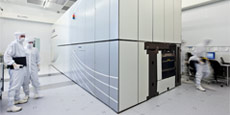VELDHOVEN, the Netherlands, and HSINCHU, Taiwan, June 2016 – ASML Holding NV [ASML], a leading provider of lithography systems for the semiconductor industry, and Hermes Microvision, Inc. (HMI) [3658TT], a leading supplier of pattern verification systems used for advanced semiconductor devices, announce that they have entered into an agreement under which ASML will acquire all outstanding shares of HMI in a cash transaction valued at about TWD 100 billion (approximately EUR 2.75 billion at current exchange rates).
The two companies are leaders in their respective fields and are already developing joint approaches that IC manufacturers can use to improve yields in the production of the most advanced microchips. The combination will allow ASML and HMI to further integrate and enhance their product offering at an accelerated pace.
The transaction, which was unanimously approved by the boards of directors of ASML and HMI, will entitle each HMI shareholder to receive TWD 1,410 per share in cash. The price per share reflects a premium of 31 percent over HMI’s 30-day volume-weighted average price (VWAP).
“Our over-arching goal is to serve our customers even better and offer them the tools they need to achieve higher yields at the most advanced nodes. This acquisition is intended to make a strong product offering even stronger. Our metrology technologies are complementary, and when combined offer the chance to significantly improve process control, and hence yields, for our customers. Our two companies have worked together for almost two years to see how we could best combine our capabilities, and found that we could significantly improve this constructive cooperation and better serve our customer by teaming up as one company. This also means that we expect enhanced product offerings faster,” said Peter Wennink, President and Chief Executive Officer at ASML.
The integrated offerings will address the challenges chip makers are facing as they enter sub-10 nanometer resolutions and 3D integration, requiring chip manufacturers to apply advanced process control. This requires very dense, high resolution metrology to measure and control device performance, whereas 3D integration requires very dense, high voltage contrast metrology for process control.
HMI has multiple years of e-beam application experience and leadership in semiconductor factories, focused on high resolution and voltage contrast imaging. HMI will continue to enhance these technologies and it will also boost ASML’s holistic lithographic portfolio of 1. lithography exposure systems, 2. computational lithography and 3. metrology. Between these three cornerstones ASML offers application products for process window enhancement, control and detection.
HMI e-beam metrology will deliver accurate patterning information, which ASML can use to optimize its powerful design and process models, a cornerstone of ASML’s successful computational lithography business. In return those models can be used to guide the optical and e-beam metrology in a cost-effective manner to characterize the most relevant features on the chip device. Ultimately, this information combined with ASML modeling will provide the ability to adjust ASML’s scanners settings for optimal operation in the customers’ factories. Therefore, the transaction fits very well within ASML’s holistic lithography strategy.
Furthermore, HMI has pioneered e-beam inspection systems that are specially designed for mask manufacturers to identify pattern defects in Extreme Ultraviolet (EUV) resulting from the mask. This will support the ramp of ASML’s EUV platform, set to be used for volume production of semiconductors starting in 2018.
“The combination of our two businesses is great news for all of our stakeholders, including our customers, employees, suppliers and investors, as it accelerates both companies’ roadmap development. We intend to continue to invest and grow HMI’s business at our two existing locations in Taiwan, where we already employ around 350 people. The transition to sub-10 nm logic nodes and the ramp of advanced memory devices require innovation, and we look forward to continuing to help our customers make it a success, now by offering HMI and ASML technologies,” said Jack Jau, Chief Executive Officer at HMI.
Future customer requirements for better control of ever denser patterns at finer chip resolutions will drive product development of the integrated company for more advanced and faster e-beam systems. ASML and HMI expect that together they will be able to serve a significant portion of this fast-growing market.
The transaction is expected to close in the fourth quarter of 2016 and is subject to customary closing conditions, including review by Taiwanese, U.S. and international regulators. Closing is also subject to approval by HMI’s shareholders. Hermes-Epitek Corporation (HEC) and certain affiliates, as well as certain officers of HMI, currently own approx. 48% of HMI shares in total and have entered into agreements with ASML pursuant to which they have agreed to vote in favor of, and otherwise support, the transaction.
As part of the transaction, HEC and certain HMI officers have also agreed to (re)invest in ASML part of the proceeds to be received by them from selling their HMI shares in the transaction, underscoring their belief in the strategic rationale for the transaction and their commitment to the combined businesses going forward. Accordingly, ASML expects to issue a total number of 5.9 million ASML shares (corresponding to approx. 1% of ASML shares currently outstanding) at a subscription price of TWD 3,106 per share (equivalent to EUR 85.24, for an aggregate value of approximately EUR 500 million)¹. The newly issued ASML shares will be subject to a minimum holding period of two and a half years.
ASML expects to finance the acquisition of HMI with approximately EUR 1.5 billion of debt, approximately EUR 500 million of ASML equity to be purchased by HEC and the relevant HMI officers as noted above, and the remainder from available cash.
Excluding non-cash purchase price accounting adjustments, the transaction is expected to be accretive to ASML’s EPS immediately.



















